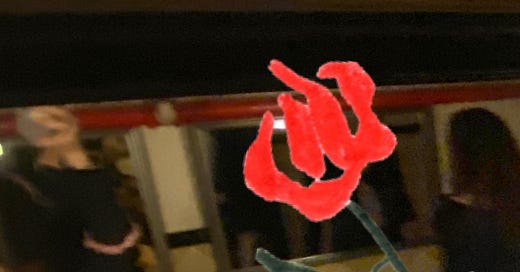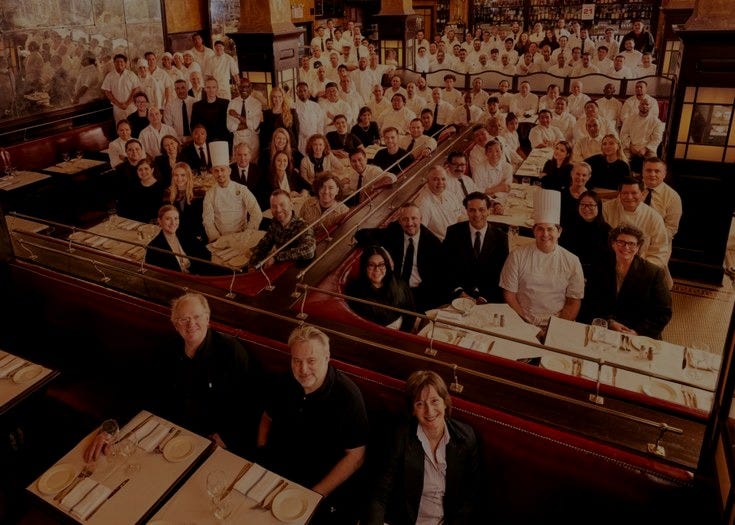I’ve long been intrigued by Mr. McNally and the spaces that he’s shaped in NYC. A couple months ago, I wrote about his memoir I Regret Almost Everything for the Paris Review. I’ve had fun reading his press, and was curious what some of his answers might look like from a restaurant or service-based perspective; less of that of the diner and more that of the server, manager, or cook. Last week, I was lucky enough to get to ask him some questions over email. Would the curtain be pulled back?
More or less. Charmingly, acerbically. With provocation and profundity. Conversation below.
RS: You wrote: “In my fifty years working and owning restaurants, my happiest times were at the Odeon, sitting down with the waiters and waitresses at three in the morning, listening to them joke about the night as they smoked, drank beer and counted their tips. Nothing since has ever matched that feeling.”
Nothing since has ever matched that feeling. What has come close?
KM: Watching my 21 year-old son, George tending bar at Balthazar.
The night Balthazar re-opened after Covid forced us to close for a year.
Sitting next to my six year-old granddaughter, Olive, during my book party 6 weeks ago.
RS: Ideal family meal?
KM: Roast chicken with crispy roast potatoes.
RS: From your book: “I was suddenly caught – as I often am – between doing what I wanted to do at the risk of upsetting others or upsetting myself by pleasing others. As usual, I chose to please others.”
I sometimes wonder if this is a quality inherent to those drawn to restaurant work. There might be an allure of putting aside one’s own desires in order to satiate another’s. Martyrdom? Intelligence? What do you think?
KM: The majority of people who - like me - receive intense pleasure from helping strangers, usually have very low self-esteem. I think this is true of most of those in the hospitality business who are great at their jobs.
RS: What books or albums did you find most influential during your time serving at One Fifth? What could one have found you reading before service started?
KM: I remember reading and rereading a lot of Graham Greene and George Orwell's essays during this period. I listened to Bryan Ferry's The Bride Stripped Bare a lot in the mid to late seventies and Dylan's Blood on the Tracks too. And of course the Sex Pistols' Never Mind The Bollocks.
RS: I’ve long believed that you have to have worked in restaurants to truly appreciate a restaurant meal. Am I being too overly-democratic?
KM: Yes, you're being over dramatic.1 By this logic, the only people who'd appreciate sex would be professional sex workers. Quite often it's the opposite. But of course you don't have to work in a restaurant to appreciate a restaurant meal.
RS: What stereotypes about FOH and BOH tend to be true?
KM: I think restaurant stereotypes have all but disappeared.
RS: Best and worst Restaurant-Person vices?
KM: Best is a good listener. Worst is a bully.
RS: You wrote: “During a personal crisis, the importance of work is often undervalued. ‘Take time off work,’ people typically say when someone’s depressed. My advice would be to work more, not less. When all else seems lost, work —of any kind— provides the one thing we need to keep going: a sense of purpose. What gives me a sense of purpose is restaurants.”
I think many are drawn to restaurant work without quite understanding why. One finds oneself working hard in a way that feels both meaningful (work is important) and arbitrary (it happens over and over, it’s not brain surgery etc). Without being overly romantic, do you think that restaurant work can be vocation? What is it about the labor that is so effective in pushing through life?
KM: Restaurant work can definitely be a vocation. Any long-term work that gives one a purpose can be a vocation.
Few things compare to completing a task and the receiving of admiration from our fellow workers. Work gives us self-respect and is - at its very least - a suspension from facing the hardships, burdens and endless, fucking obstacles of everyday life.
RS: You’ve claimed to be the least hospitable person in the hospitality industry. Who is the most?
KM: Danny Meyer. (In the worst way possible!)
RS: What do you make of the old restaurant expression: 'if you can lean, you can clean’?
KM: Never heard it before.
Thank you for reading! Go buy his book, by way of a martini at Balthazar. Xo
author’s note: This purposeful distinction made me laugh. He got me!





